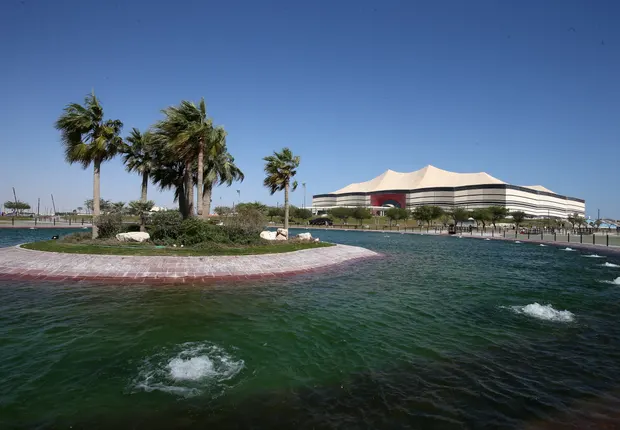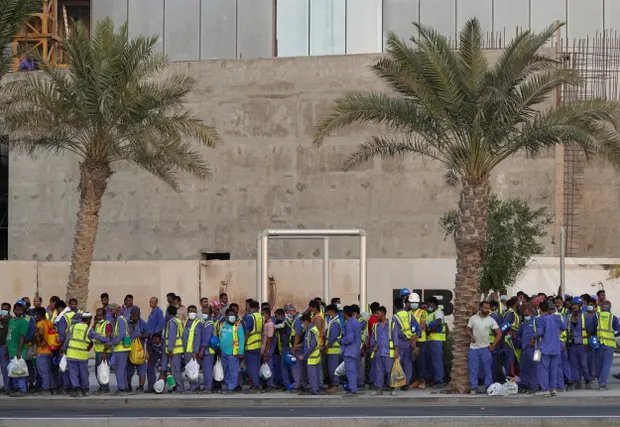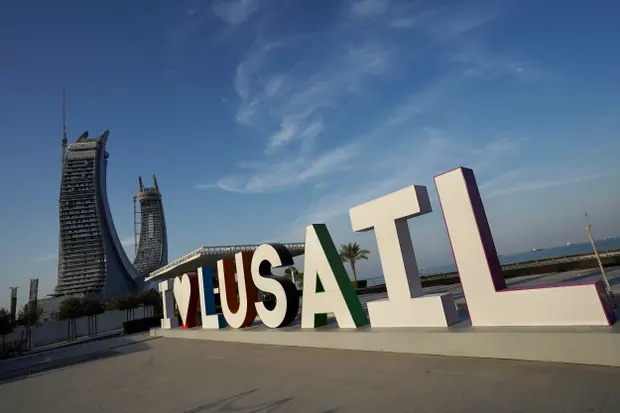Pride and Poverty: Qatar’s World Cup Fever Tempered by Legacy of Labour Abuses
EXPOSURES - EXPOSÉS, 6 Dec 2021
Pete Pattisson | The Guardian - TRANSCEND Media Service
Foreword from author Pete Pattisson
In the summer of 2013, I spent weeks waiting outside the arrivals hall at Kathmandu’s airport.
As flights from the Gulf touched down, among the hundreds of returning migrant workers were coffins, bearing the bodies of young men who had paid the ultimate price in search of work overseas. Often these bodies were being flown home from Qatar, host of the 2022 football World Cup.
That experience set me on a reporting journey that has taken me from gut-wrenching scenes in remote Nepali villages, as families cremated loved ones, to labour camps on the outskirts of Doha, where I interviewed men packed 12 to a room, who told me about the low wages and long hours they endured, often in the Gulf’s intense summer heat. Over the years, as international criticism of Qatar’s treatment of migrant workers grew stronger, the country introduced sweeping labour reforms, applauded by several international bodies, including the UN.
Earlier this year I returned to Doha to see how things have changed, one year before the World Cup begins.
After I arrived, I drove north through Lusail, a district of gaudy and outrageous buildings, which will host the World Cup final. In 2014 I reported that one was being built by North Koreans employed in conditions likely to constitute forced labour, a modern form of slavery. It is now a luxury hotel.
When Fifa executives step on to the asphalt in Doha next November, their next stop is likely to one of Qatar’s glittering array of opulent hotels, built to provide the most luxurious possible backdrop to the biggest sporting event on earth. But behind the scenes at some of those hotels I found migrant hotel workers claiming that they are struggling to survive on wages of £1 an hour. For them, and other migrant workers I interviewed, Qatar’s labour reforms seem not to have translated into significant changes to their lives.
Sitting in a park in Doha, among a group of south Asian community activists who had all worked in Qatar for more than a decade, there was a sense that next year’s tournament wasn’t for them. “We built this country but they are not thinking about us workers,” said one. “How can we afford World Cup tickets on our salaries?” another added.
******************************************************
With a Year to Go, the New Stadiums, Hotels and Roads Are Finished and Locals Are Excited, but the Low-Paid Workers Who Built Them Are Ambivalent
18 Nov 2021 – When asked if he’s looking forward to the World Cup, Mohamed, an Indian salesman, grins as he casts his fishing line off the promenade in the heart of Qatar’s capital, Doha. “Very much,” he says. “I love cricket!”
With a year to go until the football World Cup kicks off, Mohamed’s response may have the event’s organisers worried. After all, about 70% of Qatar’s population are from the cricket-loving subcontinent.
But on a Friday evening in Aspire Park, filled with families enjoying picnics and children playing football, another Mohamed has a different take. “We’re all excited and supporting the World Cup. The stadiums are amazing,” says the Egyptian chemistry teacher. “All Arabs are proud. It’s already a triumph!”
‘We Have Fallen into a Trap’: Qatar’s World Cup Dream Is a Nightmare for Hotel Staff
The two Mohameds reflect the diversity and divisions – of nationality, culture and sport – in this tiny Gulf state of 2.6 million, where 95% of the working population are foreigners.
For Qataris and Arabic speakers, the overwhelming emotions appear to be pride and excitement to be hosting the first World Cup in the region. But for the low-wage workers the Guardian has interviewed, mostly from south Asia, the response is ambivalent: a mixture of a lack of interest, a focus on earning money and the knowledge that even if they wanted to watch a match, they could never afford a ticket.
Qatar’s diminutive size – organisers have called it the “most compact World Cup ever” – is evident on the final approach to Doha from the air. In just a few minutes you glide past Al Bayt Stadium, then the Lusail Stadium comes into view, like a giant wicker basket, and as the landing gear is lowered you pass by Ras Abu Aboud, a stadium made partly of shipping containers, which will be dismantled after the event.
The view from above also reveals Qatar’s monumental ambition and wealth: seven stadiums, a new airport, roads, a metro system and hundreds of hotels. In 2017, Qatar’s finance minister said the country was spending $500m a week on World Cup-related construction.
The furthest stadium from Doha – just a 30-minute drive away – is Al Bayt, a graceful structure designed like a nomadic tent. The only other building in sight is a McDonald’s, built in the same style as the stadium.

Al Bayt Stadium in the city of Al Khor, one of seven new stadiums built for the 2022 World Cup in Qatar. Photograph: Mohamed Farag/Fifa/Getty Images
Touchy guards stand in the shade and shout at you if you try to take a photo. One says he has no interest in the World Cup, he is just here to make money. “I can be standing guard here beside the stadium or over in that town, it doesn’t make any difference to me,” he says. “I’ll leave before the World Cup. During the event we’ll have far too much work.”
Sitting in a park in Doha, a group of south Asian community activists who have all worked in Qatar for more than a decade are similarly ambivalent. “When I came to Qatar there was nothing here. We built this country but they are not thinking about us workers,” says one. “How can we afford World Cup tickets on our salaries?” adds another.
While ticket prices have not yet been announced, Fifa is already selling hospitality packages that start at £705 for a first-round match and rise to £845,000 for a 10-match package in a private suite.
The only group of low-wage workers who appear excited about the tournament are Kenyans, steeped in years of Premier League coverage. “I love football. I would love to see the players in real life. I would tell my children about it when I am old,” says one, a guard at a top-end hotel.
The shadow of abusive labour practices and workers’ deaths hangs over the tournament despite new laws to introduce a minimum wage and give workers the right to change jobs. Concern for workers’ rights has prompted protests by the Norwegian, German, Danish and Dutch national teams during the qualifying rounds.
Those concerns are shared by some workers. “We hear news of people losing their lives, so I don’t think the World Cup should be coming to Qatar. I don’t think they have apologised yet, at least to the families of those guys. They should have done something to avoid this,” says a Kenyan barista.

Labourers on the Katara Towers project in Lusail City leave the site at the end of the day. The Towers will host two luxury hotels, which will open in time for the World Cup. Photograph: Pete Pattisson
The mood among Qataris and other Arabic speakers in the country is far more upbeat. There is a sense that the country is punching above its weight, an eagerness to showcase the best of the region and satisfaction at overcoming a series of controversies that have dogged Qatar since it won the right to host the event in 2010: allegations of corruption at the bidding stage, criticism of the abusive conditions endured by migrant workers, an economic blockade led by its neighbours Saudi Arabia and the United Arab Emirates and then the coronavirus pandemic.
“The World Cup will be amazing!” says Mustafa, an Egyptian Liverpool and Mohamed Salah fan who manages a store in one of Qatar’s upmarket shopping centres. “Lots of tourists will come. They will experience a new culture. It’s a chance for different people to come together.”
Sitting nearby is Jamal, a Qatari citizen and retired IT worker, who says the World Cup is important for the region. “We’re the first Arab country to host it. It’s a big achievement,” he says. “The World Cup means a lot to Qatar. We’ve done better than other countries which are bigger than us.”
In the “VIP wing” of another mall, Abdulrahman and his friends are drinking coffee served out of a vintage delivery van. Nearby, young Asian men who want to gawp at the top-end designer stores inside are turned away at the entrance. Abdulrahman, a Qatari who works for the interior ministry, tells me about the training he is doing with his counterparts from the UK and the US to ensure the World Cup is “safe and secure”.
“The Qatari people are very eager for the World Cup. We are a country of openness; we want to excel at everything and we welcome everyone,” he says.
When I ask him who will win the World Cup, he replies with a smile: “Qatar!”
__________________________________________
Tags: Abuse, Conflict, Doha, Exploitation, Exposé, FIFA, Inequality, Migrant Workers, Qatar, Slave labor, Soccer World Cup, Sports, Violence, Work
DISCLAIMER: The statements, views and opinions expressed in pieces republished here are solely those of the authors and do not necessarily represent those of TMS. In accordance with title 17 U.S.C. section 107, this material is distributed without profit to those who have expressed a prior interest in receiving the included information for research and educational purposes. TMS has no affiliation whatsoever with the originator of this article nor is TMS endorsed or sponsored by the originator. “GO TO ORIGINAL” links are provided as a convenience to our readers and allow for verification of authenticity. However, as originating pages are often updated by their originating host sites, the versions posted may not match the versions our readers view when clicking the “GO TO ORIGINAL” links. This site contains copyrighted material the use of which has not always been specifically authorized by the copyright owner. We are making such material available in our efforts to advance understanding of environmental, political, human rights, economic, democracy, scientific, and social justice issues, etc. We believe this constitutes a ‘fair use’ of any such copyrighted material as provided for in section 107 of the US Copyright Law. In accordance with Title 17 U.S.C. Section 107, the material on this site is distributed without profit to those who have expressed a prior interest in receiving the included information for research and educational purposes. For more information go to: http://www.law.cornell.edu/uscode/17/107.shtml. If you wish to use copyrighted material from this site for purposes of your own that go beyond ‘fair use’, you must obtain permission from the copyright owner.
Read more
Click here to go to the current weekly digest or pick another article:
EXPOSURES - EXPOSÉS:

